“Women in business must be competent and smart in this time-constrained world which is full of opportunities. Aiding them are a plethora of digital tools to establish and sustain businesses. Starting an enterprise broadened my vision and knowledge and gave me greater confidence to face the world”
Ms. Nalini Murthy, Director, FarmFreshBangalore.com, India
(nalini@artyplantz.com; https://farmfreshbangalore.com)
Bhuvana N, speaks to emerging woman entrepreneur Nalini Murthy from Bangalore to understand her journey as an entrepreneur and how digital innovations help her sustain her business. Excerpts from the interview follow.
| FarmFreshBangalore.com is a Customer-Supported Agricultural (CSA) social enterprise connecting farmers and consumers to provide nutrition-rich, natural farm produce to consumers and ensure sustainable and fair income to small and marginal farmers. The company has more than 2000 active customers, over 350 farmers, 12,000 subscribers, and an annual turnover of ₹ 1.2 crores. |
What inspired you to become an agripreneur? Can you tell me about your background?
Agripreneurship was not my cup of tea until I met Mrs. Radha Desikan Eswar, founder of Fractal Entrepreneurship (https://fractalentrepreneurship.org/) in 2012. I had never given it a thought or imagined I would set up FarmFreshBangalore.Com one day. The motivation from her and incubation at Fractal Foundation resulted in what I am today!
Having been born into a farmer’s family, I was very interested in agriculture and farmers since childhood. As a natural corollary, I decided to pursue a career in agriculture following a Bachelor’s degree in Agriculture (2001) and a Master’s degree in Agricultural Extension from Tamil Nadu Agricultural University (TNAU), Coimbatore (2004). Though the education equipped me with scientific knowledge and information on agriculture practices, my desire to learn more about agriculture development and reach farmers with a reliable solution to their problems was unmet. I was always exploring opportunities to serve the farming community.
The year 2004 proved to be a turning point. That year, the coastal agricultural lands of Tamil Nadu were badly affected by a Tsunami. Sea water had entered and stagnated in agricultural land for more than seven days. The salinity of the land increased, rendering it unsuitable for cultivation. This allowed me to work as a volunteer in one of the rehabilitation projects on the 100-acre Kuzhunji farm developed by Dr. Nammazhvar, a pioneer of the organic movement in Tamil Nadu. The land was developed into a green healthy forest without using chemical fertilizers or pesticides. It was very surprising for me at that time. While my college education had taught me the use of chemical fertilizers, here was an instance where a crop could be grown without any chemicals. I began to visualize a very different and safe world.
After that, I worked at several non-government organizations such as PREPARE (an NGO working on Tsunami Rehabilitation); ADRA – International (rehabilitation); AME Foundation, Bangalore; and ARTYPlantz, Bangalore, which works in the areas of natural farming, organic agriculture, sustainable agriculture, and biodynamics. I worked as a columnist on urban farming for The New Indian Express for two years. The experience I gained in Organic Terrace Gardening (OTG) under Dr. Viswanath Kadur also spurred my interest in chemical-free, poison-free food production and the possibilities through organic practices.
How did you come across Fractal Entrepreneurship Foundation and how was your journey?
In 2012, I was a new mother looking for a job. Mrs. Eswar of Fractal Entrepreneurship came across my profile on a jobhunting site and offered me a job where I could take my child to work. This new opportunity made me realize how the world had progressed. I soon joined Fractal Entrepreneurship Foundation and worked with her on several pilot projects. I had a passion but not a business idea. At work, her constant mentoring turned my passion into a sustainable business idea. The Foundation incubates individuals like me who dream of making a difference in society through sustainable practices that are not detrimental to nature. They impart incubates with business, technical, communication, and social skills and enable innovation and strategic thinking. These skills vastly boosted my entrepreneurial spirit.
During the process of incubation, the idea of FarmFreshBangalore.Com emerged, and it was incubated at Fractal Entrepreneurship Foundation based in Bangalore. In 2018, it started working as a separate entity. Other similar startups like Urban Mali Network (urban gardens without chemicals), Sampoorna Ahara (healthy food incubator), and Horticultural Therapy (palliative care to patients) emerged under the same mentorship and are connected. Mrs. Eswar imbibed in us the values of social enterprise and work towards developing equal opportunities for all and promoting horizontal growth rather than vertical growth. We meet every first Saturday of the month to exchange new ideas, views, strategies, and resources to develop startups. For instance, FarmFreshBangalore.Com and Sampoorna Ahara share business premises and also a customer base.
How did you come up with the idea for your business, and what issues does it address?
My experience working with development organizations and conducting farmer training programs made me realize the two sides of the divide that need to come together. While farmers know what they are doing and have to do and have enough knowledge about cultivation practices, on the other side are consumers who need good and safe food and are ready to pay for it, irrespective of the price of the produce. But this gap is not being narrowed. There are several hurdles in the way farmer’s produce reaches the consumer’s basket. This made us realize that farmers are really in need of market support for their produce. Farmers face two crucial challenges – marketing and getting the right price for their produce. This was the idea behind setting up FarmFreshBangalore.Com.
Walk us through the process of launching your business and the biggest challenges you faced.
The journey of FarmFreshBangalore.Com is not as simple as it looks. My first challenge as an aspiring entrepreneur was how to transform my idea into a form. While we may have a dream, how to turn it into reality often befuddles us. Incubation centres and mentors like Mrs. Eswar provide support in turning ideas into an enterprise.
The second challenge is identifying the source of investment. There are innumerable financial opportunities for startups today. But, getting an initial investment is highly challenging. So, initially, I invested my own money, through my savings, and pledged jewellery and some assets. We slowly began earning money which was enough to meet our expenses. When there was a sustained cash flow, we obtained a ₹ 10 lakh MUDRA cash credit loan from a bank in December 2021. But all has not been smooth sailing. There have been critical financial situations when our customers helped us out by obtaining annual subscriptions and connecting their friends to subscribe. In that sense, it would be right to call ours a customer-supported enterprise.
How did you go about expanding the business?
It all started with being a one-woman show– identifying customers and organic farmers, deciding on the price for the produce both on the supply and demand sides, budgeting, procuring the produce, cleaning, grading, packing, and delivery. Though it was quite stressful, I planned every activity and mapped ways to identify both producers and consumers.
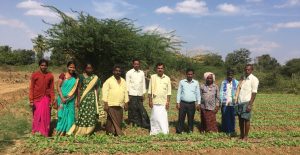 Meeting with farmer groups
Meeting with farmer groups
I adopted a participatory approach in villages to identify farmers, interacting with individuals and groups of farmers and explaining to them the initiative, its benefits, and steps to join the enterprise. It was quite a challenge identifying farmers who are purely into organic farming with certification to produce crops; that’s where my extension lessons, skills, support from the Department of Horticulture and Indian Institute of Horticulture Research came in handy. Once the farmers were convinced and a certain amount of trust was established towards FarmFreshBangalore.Com on the assured market price (10-15% more than the conventional market price), the business started to take shape. While we used local transport to procure the produce from farmers, public transportation proved to be commercially viable and cheap for growing startups like us.
Until the enterprise made some profits it was highly challenging. Being a woman there were also challenges from the family, having to prove myself and the worth of the enterprise and its future. As the business became sustainable, I gained support from everybody.
How did you identify your potential customers?
Following the confirmation from producers to supply produce, the consumers are identified using social media sites such as
Facebook (https://www.facebook.com/farmfreshbangalore);
Instagram (https://www.instagram.com/farmfreshbangalore/?hl=en);
YouTube (https://www.youtube.com/@farmfreshbangalore2520);
LinkedIn (https://www.linkedin.com/in/nalinimurthy/);
WhatsApp groups; through acquaintances and word of mouth.
Every internet source meant for communication was explored for advertising and popularizing the enterprise with a variety of offers and freebies. This helped us increase our clients. Word of mouth and feedback from customers on social media sites brought FarmFreshBangalore.Com recognition and widened our customer network.
As we deal with perishables, it is highly important to procure, sort, and supply the produce on the same day to customers. We don’t have a cold storage facility. It is more like farm to fork but we facilitate and add value by procuring the produce from farmers, cleaning, sorting, grading it, making customized nutrition balanced baskets based on dietary recommendations, and delivering the same at the consumer’s doorstep in an easily storable way.
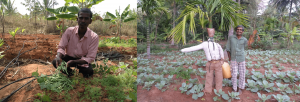 Farmers supplying to farmfreshbangalore.com
Farmers supplying to farmfreshbangalore.com
Where does your farm produce come from?
About 80% of the vegetables are procured from Bangalore and its vicinity (within a 40 km radius). The fruits and other specific products are procured from other states, for instance, avocado from Kodaikanal, spices from Kerala, apples from Shimla, and grapes from Nashik. Farmers in these states are identified through the organic farmers’ forum web page or from the website of the Horticulture Department. The list of farmers certified as organic producers within and outside the state is available on the website. For instance, from the 1000 farmers registered under the organic farmers’ forum, we contacted at least 300 active farmers and tried to get the produce with an assured income to producers and at the same time pricing the produce affordably for consumers. We are expanding our network and reaching consumers through research, word of mouth, acquaintances, networking on various platforms, conclaves, seminars, workshops, conferences, buyer-seller meets, etc.
What are the main consumer challenges FarmFreshBangalore.Com is addressing?
FarmFreshBangalore.Com mainly addresses three challenges – the low availability of nutritious food for consumers, the lack of marketing support to farmers, and the limited business or employment opportunities for agriculture graduates and diploma holders.
We observed that in general there is no practice of consuming recommended quantities of fruits, vegetables, and greens even though people are aware of how their inadequate consumption can lead to poor health and lifestyle diseases.
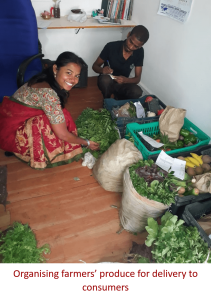 To address this first challenge, we designed economic nutrition packages. Our target customers are urban dwellers in cities like Bangalore. We sensitize them on eating healthy and poison-free food by providing whole food plant-based nutrition packages, recommended by doctors. For this, we teamed up with Dr. Achyutyan Eswar, founder of Sampoorna Ahara, Bangalore. Under his guidance, we researched the nutritional requirements for an individual/family (all age groups) and what could be supplied through plant-based nutrition packages. Based on this, we customized the nutrition basket with the right quantity of fruits, vegetables, and greens that meets their nutritional requirements. For instance, an adult has to consume 400 gms of fruits, 150 gms of vegetables, and 120 gms of greens per day to meet daily nutritional needs. We use our e-commerce platform to market these packages.
To address this first challenge, we designed economic nutrition packages. Our target customers are urban dwellers in cities like Bangalore. We sensitize them on eating healthy and poison-free food by providing whole food plant-based nutrition packages, recommended by doctors. For this, we teamed up with Dr. Achyutyan Eswar, founder of Sampoorna Ahara, Bangalore. Under his guidance, we researched the nutritional requirements for an individual/family (all age groups) and what could be supplied through plant-based nutrition packages. Based on this, we customized the nutrition basket with the right quantity of fruits, vegetables, and greens that meets their nutritional requirements. For instance, an adult has to consume 400 gms of fruits, 150 gms of vegetables, and 120 gms of greens per day to meet daily nutritional needs. We use our e-commerce platform to market these packages.
The second challenge of ensuring a sustainable income for farmers is mainly addressed by empowering them to produce what consumers need. This is where our tailormade subscription model plays a role. For instance, if I have 1000 subscribers, we communicate this demand in advance to farmers for them to produce the required quantity. Hence, farmers provide us with the required quantity of produce, supporting us in minimal customization (organic and diversified crop production) of produce. This reduces the farmer’s stress of having to take produce to a market; so, they can concentrate on the production.
We believe that adopting good farming practices to produce premium quality produce will get a premium price for the produce. We pay a fixed price to farmers and make sure that a minimum of 50-60% of what the customer pays goes to them. Money is needed to maintain the enterprise and pay for staff salaries. The subscription model aids farmers in need-based production which encourages sustainable income and reduces market stress. This is a major issue to be addressed in agriculture.
To address the third challenge, we created fractals, which are like franchises. They work in the same subscription model at different locations in the city. Each fractal can be created and run by agriculture graduates, there by generating business and employment opportunities.
How are the prices for the produce fixed?
The market price, especially for perishables, is not stable. At times it becomes highly challenging to convince farmers of the price. So, we analyzed 15 years’ data from IIHR, Bengaluru, HOPCOMS, Karnataka (daily price updates), and Mandis (weekly price updates). Based on the trend, we fixed a price for each produce at 15-20% more than the conventional market price. We observed that the price of a few perishables reaches the maximum or drops to the minimum at least once each year. Instead of expecting only a high price once a year, we advised farmers to have a sustainable income throughout the year. But again, we don’t compel them to sell the produce at the price fixed by us. They can sell their produce at the pre-decided FarmFreshBangalore.Com price and sell the surplus in the market or to other organizations like ours. FarmFreshBangalore.Com also facilitates farmers’ sale of produce in the market for a better price.
What are the mechanisms in place to ensure transparency between customers and producers?
To assure customers that they are getting farmer produce that is genuinely organic and grown without any chemicals or fertilizers, their organic certification certificate is uploaded on our website. If a farmer does not have such a certification but is growing crops without applying any chemicals, the farmer has to give us a self-declaration form stating that the crop is produced organically without chemicals/fertilizers/pesticides before, during, and after crop production. Similarly, farmers can also get the margin we make in the business by tracing the prices quoted for the produce through the website. In short, we make sure that all three — producers, consumers, and FarmFreshBangalore.Com — are in a win-win situation.
What is the frequency of the procurement and delivery of produce?
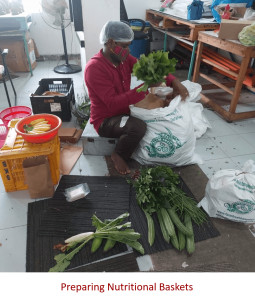 Procurement and delivery are everyday processes; 365 days a year. Farmers clean, sort, and grade the produce at the farm gate. But, after procurement we repeat the process. Four staff are engaged in produce procurement, cleaning, grading, packing, and delivery.
Procurement and delivery are everyday processes; 365 days a year. Farmers clean, sort, and grade the produce at the farm gate. But, after procurement we repeat the process. Four staff are engaged in produce procurement, cleaning, grading, packing, and delivery.
The recommended nutritional baskets are prepared following Dr. Gregor’s daily dozen optimal nutrition recommendation for individuals (adult/child/women)/families. We rely on Artificial Intelligence (AI) to generate customized data based on Dr. Gregor’s prescription. The nutrition basket is prepared for 52 weeks considering our subscriber’s profile. Weekly baskets vary as per the recommendation. Our vegetables are classified into gourds, cruciferous, roots, and pods which are all included in the nutrition baskets, with vegetables under each category varying each week. So, by the end of the month, our customers would have consumed almost all kinds of vegetables in recommended doses. Some customers ask for the replacement of vegetables.
What is the scale of the enterprise?
My business of one expanded with my husband assisting me. Later we hired two full-time employees for packaging and deliver produce. Now, in addition, we have an accountant, a customer relations manager, and four staff for logistics management.
On the demand side, from a meager 30 subscribers in 2018, we have grown to more than 2,000 active subscribers. At the supply end, initially we procured produce from only three farmers. Later on, we shifted to farmer groups (30-40 farmers) and are now working with farmer producer organizations to meet the increasing demand. Now around 350 farmers are linked with us to market their produce.
Our financial turnover too has grown, from our initial investment of ₹ 10 lakhs and an income of ₹ 14 lakh. Every year at least ₹ 10-15 lakh investment is being added, while the gross income has also doubled. In this financial year, we invested ₹ 50 lakh and earned a gross income of ₹ 96 lakh. Annually, our profits are going up by 10-12%.
What is the unique selling proposition that distinguishes you from your competitors in the industry?
Our unique innovations benefit both consumers and producers in a sustainable way. This differentiates us from other competitors in the business. Our customers benefit via a cost-effective holistic nutrition package, fixed cost irrespective of market fluctuations, and the adoption of digital tools in the business (https://farmfreshbangalore.com/), and door delivery of chemical-free fresh fruits and vegetables, saving on time and energy.
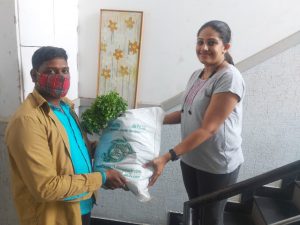 Door delivery of Nutrition Basket
Door delivery of Nutrition Basket
Our farmer producers benefit through need-based production which is possible through our subscription model, a fixed price, sustainable income throughout the season, and reduced or no market stress.
What has your biggest success been so far, and how did you achieve it?
For an entrepreneur like me, every passing day, every new subscription, and every new farmer network is a success. In our five-year journey of success, we are now a family of 3,000 active customers, 350 active producer networks, and 6 staff.
To mention a specific case of success, during the COVID-19 period our enterprise tried hard to meet the demands of urbanites with fresh plant-based nutrition packets though we could not meet the demand. It is also worth mentioning that Farm Fresh has subscribers globally who want us to lend our services to their families in Bangalore. This exposure has allowed me to be a guest speaker at institutions such as MANAGE, Hyderabad, University of Agricultural Sciences- Dharwad to motivate other aspiring entrepreneurs.
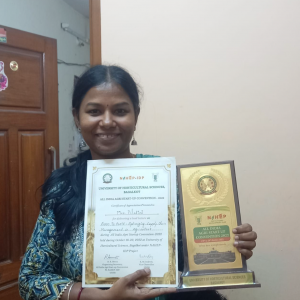 From her participation in the All India Agri Startup Convention 2022 held at the University of Horticultural Sciences, Bagalkot where she presented about Farm to Plate model of farmfreshbangalore.com
From her participation in the All India Agri Startup Convention 2022 held at the University of Horticultural Sciences, Bagalkot where she presented about Farm to Plate model of farmfreshbangalore.com
Together, factors such as our active involvement in social media platforms, mutual networking ability, diligence, quality products and services to producers and customers, trust among the FarmFreshBangalore.Com family (staff/producers/customers), and continuous efforts towards growing have been key to our success.
Can you talk about a failure or setback you’ve experienced in the business and what you learned from it?
In the first year of the business, the procurement of produce posed a challenge as the company worked with individual farmers spread across a 100 km radius. Transportation and logistics expenses amounted to 25% of the investment. However, we were able to identify cost-effective public transportation wherever possible. We then adopted a cluster-based model covering 5-20 farmers in each cluster that helped reduce costs. During the summer, procuring greens was difficult due to irrigation problems, but the cluster-based model and cooperation of farmers led to solutions. Staff coordination was another challenge as there were ego issues and a lack of coordination, which we tackled with a humane attitude, clear communication, and a flexible work system to improve coordination. Proper planning and backup funds for emergencies were lacking, resulting in setbacks. The company developed a savings plan and reserved funds for emergencies.
How are digital innovations supporting your business?
Digital innovation has a key role in agri startups or any business for that matter. In our case, our website provides all the information about us, the supply of and demand for organic produce, and our contact details.
Secondly, our social media sites give us much publicity and connect us with more customers within and outside the city.
Thirdly, about 98% of our financial transactions with producers and consumers are through digital payment gateways, online wallets, UPIs, and net banking. We collect cash only when senior citizens fail to use digital tools. We have tied up with Razorpay gateway for secure payment processes.
Fourthly, we have a WhatsApp group of producers, consumers, and incubates of agri startups. These are great platforms to share our product offerings, exchange ideas, views, put forth a new proposal, seek mutual help, etc.
Women find these digital tools safer, with no face-to-face interactions and dealings.
How effective is it to rely on digital tools for a sustainable business?
Our enterprise began without a website. All the information was in spread sheets, and information sharing was through WhatsApp messages. This made tracing and tracking this information is cumbersome. Through Zoho, we chose a website that cost us hardly ₹ 1000- 1500/ month and set about designing it. Such platforms are good as initial options. My husband who is a graphic designer helped out and now takes care of all social media marketing and promotions. Once the enterprise became sustainable, we shifted the website platform to Shopify and hired professionals to fine-tune the website with additional plugins.
Having a website (https://farmfreshbangalore.com/) during the time of COVID-19 doubled our customer base and business. Such digital tools have sustained several startups like ours. Our subscription base increased. It saved both customers’ and producers’ time and allowed for timely online payments. In a place like Bangalore with working families/individuals, it becomes more convenient, saves their time, and reduces stress while at the same time, they no longer have to worry about missing their nutritional intake as we supply well-researched nutritious baskets. Moreover, once people subscribe to our service, there is no change in cost for three months despite variations in the price of fruits/vegetables/greens. Another advantage is the door delivery of our products.
Our website contains blogs that have good visibility and response from our customers. These digital tools help us monetize every opportunity and widen our reach. For instance, a mother with a gluten-allergic son recently sent us very positive feedback on how a blog on our website on gluten-free bajra as an alternative had helped her. This personal touch is important. She is regularly in contact with me and is one of our prime customers now.
In addition, digital tools like Grammarly, Chat GPT, etc, are aiding the writing and publishing of blogs.
Presently, we are relying on digital marketing. We have found ways to get leads through Google ads and Facebook ads which don’t call for huge investments. This is one of the most convenient ways to promote the business.
Through the fractal incubation centre, we are working on creating a virtual PaaS platform for business operations for Fractal Entrepreneurs and an AI-aided incubation platform for new aspirants of Fractal Entrepreneurship. Digital innovations are key to the survival of any business and for ease of doing business. I am keen on applying digital innovations related to traceability of produce, a tool to check whether the produce is organic/inorganic and where everybody can also check the authenticity of the produce.
How do you stay motivated and focused on your goals?
My passion and progressive attitude in addition to the work experience with stalwarts like Mr. G. Nammalvar, Dr. B.N. Vishwanath, Mrs. Eswar, and my fractal friends keep me motivated and focused.
What kind of challenges did you face being a woman entrepreneur, and how did you overcome them?
The challenge started from home, with my family’s discomfort with my business plan. I’m certainly not an exception in this country where married women are stereotyped only as caregivers of kids and family. My family would have been more comfortable with a 9-5 job that gave me ample time with the family.
I cannot but help recall the words of my mentor Mrs. Eswar, who believed that there is always a way out without compromising either business or family interests. It is just a matter of strategizing and learning to delegate work (which comes easily to men). I learned this over a period of time. The business needs to be viewed as a child that needs care and attention to grow well. Women being experts at multi-tasking, running both a business and home should not be difficult once skills have been mastered, strategies around problems have been figured out and delegation of work happens.
For a woman, finance is also another challenge. Getting a loan sanctioned needs the husband’s signature. In my case, I was always clear and honest about the purpose of the business, investment needed, my financial status, how I would make money out of the investment, the present status of the enterprise, my cash flow status, etc. That’s how I got my loans sanctioned. Responsibly repaying loans is also important. Success does not happen at the push of a button…it is the fruit of being responsible and focused.
How do you see your business evolving in the next few years?
We have plans to establish four more centres/fractals in Bangalore City with a target of delivering chemical-free food to 12,000 subscribers by 2025. We will also expand our direct/indirect support to at least 1,000 small and marginal farmers who are doing natural/ organic farming.
Our vision is to support farmers who are keen to transition from chemical farming to organic farming through the formation of a Farmer Fractal Foundation. We have to create a farmer fractal to bring about a shift in cultivation practices from chemical to organic. While farmers are aware of the consequences of chemical farming, many continue it due to societal pressure. So, it is important for extension personnel to educate and influence them to shift to organic farming. In certain cases, social recognition can reduce societal pressure to bring about a big change in the village.
What are the biggest lessons you learned as an entrepreneur?
Every day is a new lesson for me. My world expanded exponentially once I started my incubation journey and the enterprise. My vision and my thoughts broadened. I told myself that what I eat must also be consumed by my customers. If I was facing an issue, so were my customers. This broad understanding reduced my fears and gave me the strength to face new challenges.
Remember that you are your support system and need to be mentally strong. Tomorrow, I should be able to show my kids the right way of living, doing things, and leading a better life. When it comes to businesses, maintaining transparency in operations and remaining loyal to customers are important. Establishing trust between producers and consumers sustains the business in the long run. This was one of the greatest lessons I learned.
What’s your advice to entrepreneurship aspirants?
If you have an idea, get it incubated through a well-established incubation centre that helps you explore opportunities and gives wings to your ideas. There is a vast market opportunity for agricultural graduates or anyone else. Just to give you an example, consider Bangalore city with its population of around 1.2 crores. At present, we are targeting only 12,000 families, barely 0.001 % of the population! That is the extent of opportunities that await you!
Acknowledgement: This interview was done as part of the IRRI-CRISP ongoing project “Mapping of Good Practices in Digital innovations in India Supporting Women Agrientrepreneurs”.
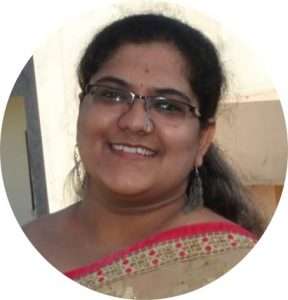 Dr. Bhuvana N, is a Research Consultant at the Centre for Research on Innovations and Science Policy (CRISP). She can be reached at email: bhuvanaditya7@gmail.com
Dr. Bhuvana N, is a Research Consultant at the Centre for Research on Innovations and Science Policy (CRISP). She can be reached at email: bhuvanaditya7@gmail.com

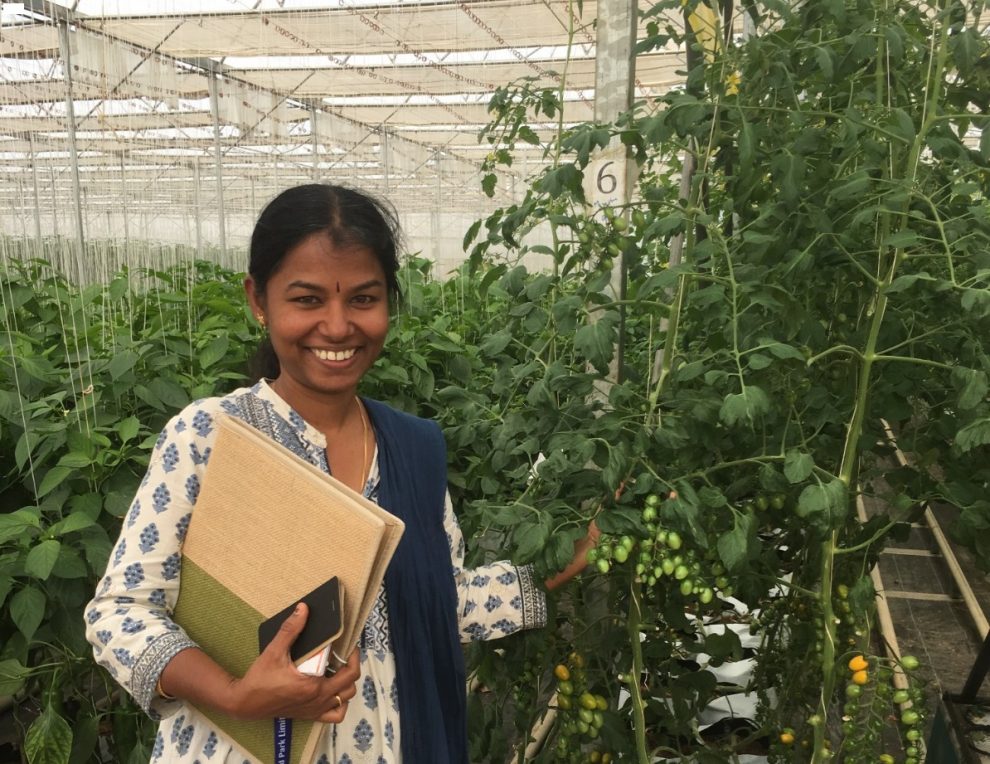

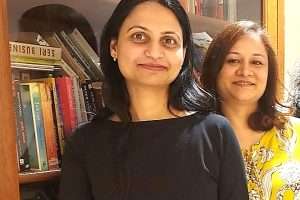

Add Comment